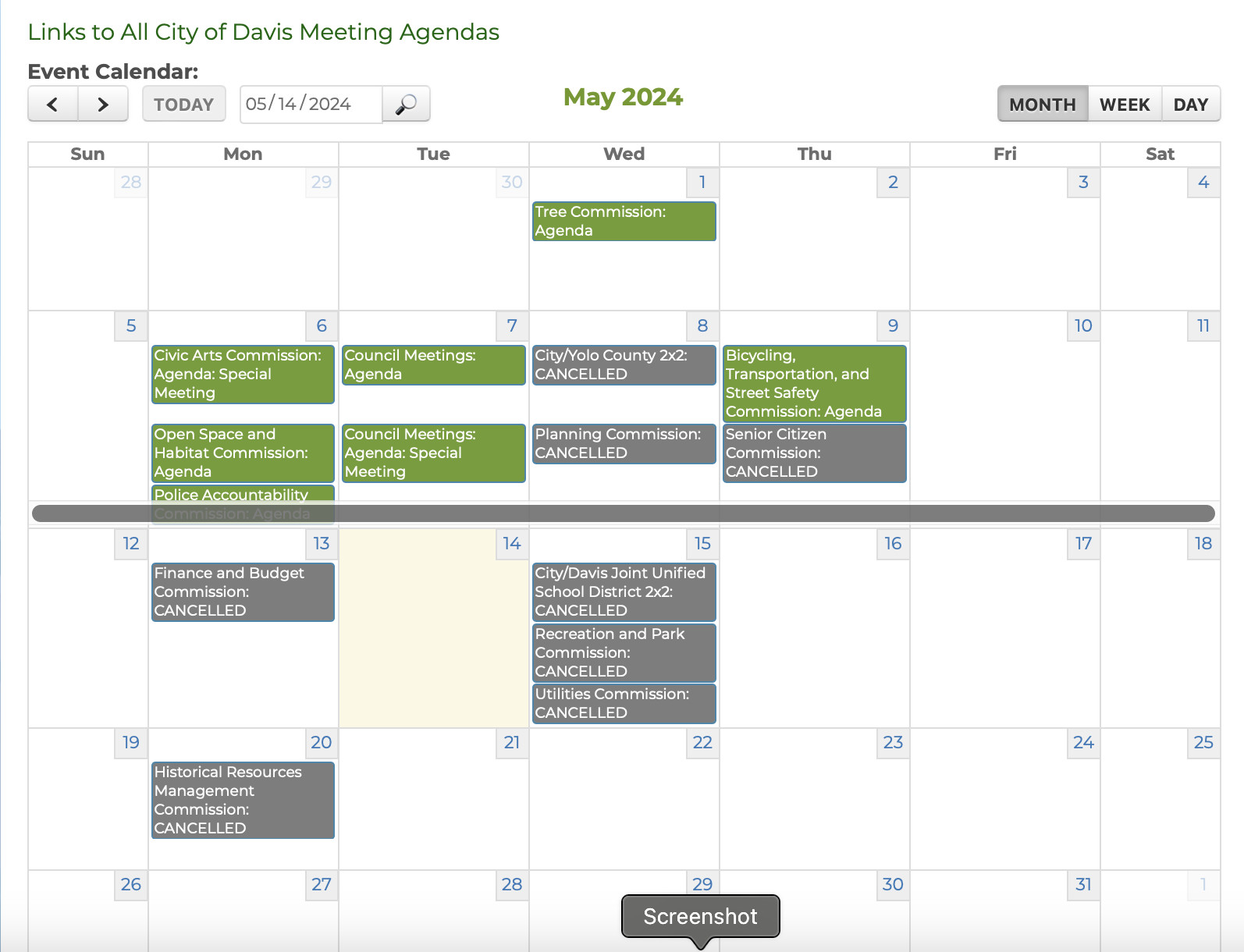
By Elaine Roberts Musser
It appears that our long-established city commission system is in chaos! Look at what happened in the month of May—many cancelled commission meetings.

Because of Councilmembers Vaitla and Chapman refusing to appoint applicants to commission vacancies, the Finance and Budget Commission (FBC) has appeared not to be able to meet for nine months and counting. Nor is the Senior Citizens Commission (SCC) meeting anymore, for lack of a quorum. Many commissions have not been able to meet on a regular basis because of quorum problems.
To add insult to injury:
-
- In a staff report written by Councilmembers Vaitla and Chapman, they prematurely and presumptuously claimed to be recruiting applicants for “newly merged commissions,” even though the City Council hasn’t weighed in on merging any
 commissions.
commissions. - Councilmember Vaitla has said publicly that commissions are dysfunctional, don’t give the City Council information it wants, and commissioners are somehow “privileged.”
- In a staff report written by Councilmembers Vaitla and Chapman, they prematurely and presumptuously claimed to be recruiting applicants for “newly merged commissions,” even though the City Council hasn’t weighed in on merging any
159 commissioners, former City Council members and concerned citizens signed a petition to stop the mergers. Councilmember Vaitla did make the rounds of the commissions to be merged, and many commissioners voiced their concerns.
-
- Commissioners are not well versed in two disparate subject matter areas.
- There will have to be more meetings/longer meetings to cover all the material required.
- Critical issues will get less attention because of time constraints.
- Recruiting qualified commissioners will become more difficult since they will be expected to be well-versed in two subject matter areas. Commissioners are apt to quit from burnout and frustration at the heavy workload.
- The proposed scopes of the merged commissions are vague and unclear to the point of being almost meaningless.
- Once commissions are merged, it is highly unlikely the former commissions can be resurrected, if things go wrong (which is likely—2 commissions are already defunct).
- Fiscal oversight of the city budget will be minimal, endangering any city tax measure.
This issue is to be heard on Tuesday, May 21, 2024 @ 6:30pm. SPEAK OUT AGAINST THE MERGERS AT THE MAY 21 CITY COUNCIL MEETING. Express your discontent. Either:
-
- Preferably come in person to the City Council meeting on May 21; or
- Record a message ((530) 757-5693); and/or
- Write a letter to City Councilmembers (citycouncilmembers@cityofdavis.org).
See petition and updates at the following link:


One thing I have been following is how many Planning Commission meetings have been cancelled in the last year.
By my count 15 cancelled and only 9 held since April 2023.
On April 17th I attended the meeting of the Utilities Commission for which the one agenda item was a Consider Council Subcommittee Proposed Scope of Fiscal Commission” discussion with Councilmember Bapu Vaitla, City Clerk Zoe Mirabile, and Public Works Utilities and Operations Director Stan Gryczko.
I attended in large part because I am a past member and Chair of the Finance and Budget Commission, as well as a member of the Utilities Commission. I wanted to hear Both what the current Commissioners had to say and what the three City representatives provided as documentation materials and responses to the Commissioner questions.
It was a contentious meeting with Councilmember Vailtla immediately on the defensive because the Utilities Commission Chair clearly stated that he had never been contacted by the Council Subcommittee despite their assertions that they had. I also had been told by the Chair of the Finance and Budget Commission that he too had never been contacted by the Subcommittee.
The Scope statement for the proposed Fiscal Commission was interesting in its sparseness and what was/is missing from the current scope statements of the Finance and Budget and Budget Commission and the Utilities Commission. It read:
Most noticeably missing from the current scope of Finance and Budget was/is:
Councilmember Vaitla’s comments clearly showed that the Council does not want the new Commission to do anything other than review the spending plans of the annual Budget.
Most noticeably missing from the current scope of the Utilities Commission was anything relating to operational oversight and/or planning. Back in the middle of 2019 in joint discussion with City Council, the Utilities Rate Advisory Commission was renamed and rechartered as the Utilities Commission. In that process Council approved the following two additional scope and function statements for the new commission
Prior to that change the URAC’s only responsibility was rates. In the new Fiscal Commission scope statements, all consideration of “utility customer needs and satisfaction with utility services” is gone, as is “evaluate and compare options to improve utility service” and “social and economic equity effects of utility service” and “consideration of short and long term factors and consequences identified in rate studies” and “long-term strategies to achieve service value and efficiency, resiliency, environmental sustainability, and other City objectives.” Throughout the history of the Utilities Commission, City Staff has complained about and event undermined the Commission’s efforts in the operational and planning efforts put forth by the Commission.
Councilmember Vaitla’s responses to the Commissioners’ questions made it very clear that what Council wants is a Fiscal Commission that only looks at the reported numbers on paper for accuracy … and steers clear of any thoughts of accountability or proactive planning.
That clearly stated desire is ironic given the fact that the last audited financial statements published by the City are for the period of July 1, 2020 through June 30, 2021, which was issued this January 2024. The prior 12-month period audited financial statement was issued in January 2021.
Can you imagine purchasing the stock of a publicly traded company that has three years of open unaudited financial statements? Would your personal financial advisor recommend such an investment? Is having unaudited financials out of compliance with Generally Accepted Accounting Practices (GAAP)? What does the absence of audir]ted financials say about the City of Davis’ commitment to fiscal accountability?
Elaine Roberts Musser has hit the nail on the head when she says, “It appears that our long-established city commission system is in chaos!” It also appears that our City finances are in chaos too. No wonder there are seven vacancies on the Finance and Budget Commission. Would you want to be responsible for giving a “Yea” or “Nay” to the state of the City’s finances?
At this point, being on the Fiscal Commission could expose a personal liability for approving a budget without a full audit and without any oversight. There’s a similar risk for utility rates.
We are witnessing right now the failure of the CPUC to oversee the decisions and operations by PG&E and electricity rates increased 30% over the last year. And PG&E isn’t an exception–these types of increases are becoming widespread across the country as utilities face less oversight. Gutting the Utilities Commission will only lead to less City credibility, not more.
Neither Commission makes the final decisions to approve the budget or rates as they are strictly advisory commissions, so there is no ‘personal liability’ for their members.
When has the City’s budget ever been audited?
Mark, the City has issued audited financial statements every year, up through Fiscal Year 2020-2021. They all can be accessed HERE (https://www.cityofdavis.org/city-hall/finance/comprehensive-annual-financial-reports-cafr)
The purpose of the commission system is to provide input to the City Council. If the Council members no longer value that input, then why do we still have the Commissions? The Planning Commission is the only one that is required by law. For all the rest, if the work product is ignored by the CC, then that commission should be reconfigured or shut down. Continuing with the status quo is a waste of time and our limited resources.
Mark makes a very good point. If ther Council members no longer value commission input then they should set an agenda item that proposes, discusses, and passes a resolution (or possibly an ordinance) that puts in place the reconfiguration or the shut down.
Currently each Commission has a City Council established Function, which appears on the City webpage for each respective Commission. Until Council takes action to change the work of prior Councils in establishing those Function statements, they are part of the formal City of Davis legal structure.